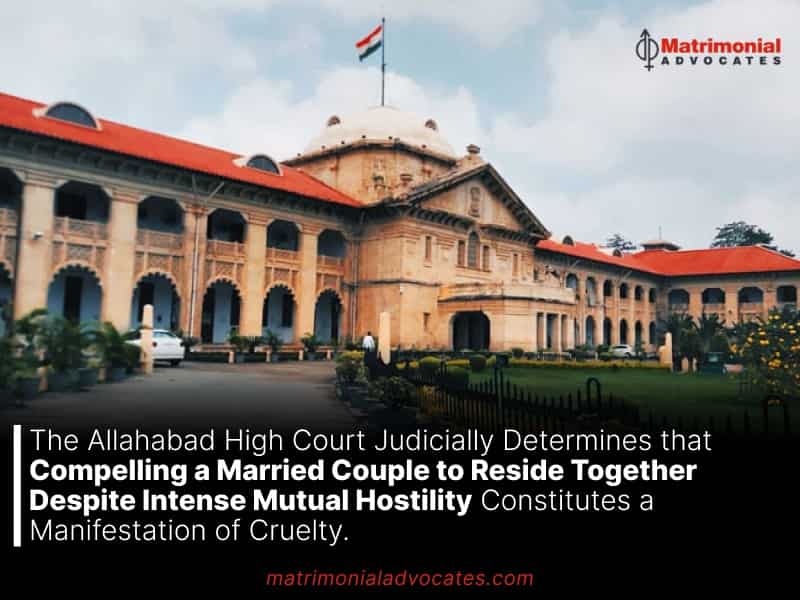
The Court also noted that the spouses had been living separately for over ten years. While granting the divorce, the Court directed the husband to pay ₹1 crore as permanent alimony within 3 months.
In a recent legal adjudication, as exemplified by the case Ashok Jha v. Pratibha Jha, the Allahabad High Court judiciously articulated the position that compelling a separated husband and wife to cohabit, notwithstanding their profound mutual antipathy, constitutes a form of cruelty. Justices Saumitra Dayal Singh and Arun Kumar Singh Deshwal additionally advanced the viewpoint that such an imposition may engender ramifications of graver societal concern in contrast to permitting the dissolution of the marital bond.
“Both parties have lodged criminal cases against each other and have serious disputes about the properties. Apart from this, both parties are also making allegations against each other of having relationship outside of marriage, therefore, forcing them to live together despite their intense hate towards each other will amount to cruelty,” the Court noted.
In the context of an appeal brought forth by the husband in opposition to the dismissal of his divorce petition by a family court on November 7, 2019, the Court issued a directive mandating the husband to disburse a permanent alimony amounting to ₹1 crore to his wife within a stipulated three-month period. Furthermore, it was explicitly ordained that in the event of any delay in the fulfillment of this financial obligation, an annual interest rate of 6% would be applied, retroactively calculated from the date of the judgment until the actual remittance.
The husband and wife, who entered into wedlock in 2002, initially witnessed the husband securing an uncontested divorce decree in 2016. However, subsequently, the wife pursued the reversal of the aforementioned divorce decree, a request that was subsequently granted.
As a result, the divorce petition was revived, and both parties presented their respective contentions before the family court. The legal counsel representing the husband contended that the wife had unjustly embroiled him in criminal litigation, culminating in his eventual exoneration. Moreover, it was argued that these unjust accusations, coupled with additional legal disputes, had inflicted emotional distress upon the husband and were deemed to constitute acts of cruelty.
Furthermore, it was posited that the couple had been living separately since 2014, and the enduring acrimony stemming from these protracted legal contentions rendered the prospect of reconciliation unfeasible.
In light of the specific factual matrix surrounding this case, the Court observed that while direct substantiation of cruelty within their daily interactions by the husband was not evident, the actions of the wife, including the institution of groundless criminal cases and her ongoing involvement in legal disputes, were adjudged to meet the threshold for constituting cruelty.
“It is clear that though the appellant could not clearly establish the cruelty on the part of the respondent till filing a divorce petition in their day-to-day life, this fact is also undisputed that the respondent had lodged one case under Sections-498A, 420 506 and 507 IPC in 2014, before the filing of the divorce petition by the appellant,” the Court’s order stated.
In addition, the Court predicated its decision on a pertinent legal precedent from the Supreme Court, specifically the case of Naveen Kohli v. Neelu Kohli (2006). This established legal doctrine recognized the act of making unfounded complaints against a spouse as a legally sanctioned manifestation of cruelty.Top of Form
“In the present case, both the parties have levelled allegation against each other for not maintaining the sanctity of marriage and their involvement in relationship outside of marriage and they have been living separately for more than ten years and number of complaints including the criminal complaints have been filed by the respondent against the appellant and every effort has been made to harass and torture him. Appellant had also filed a case against the respondent. Even, at this stage, respondent is not ready for any conciliation with the appellant,” the High Court added.
As a consequence, the husband’s application was duly authorized, resulting in the dissolution of the marriage predicated on the husband’s substantiated assertions of cruelty and the demonstrable irreparable breakdown of the marital consortium.





